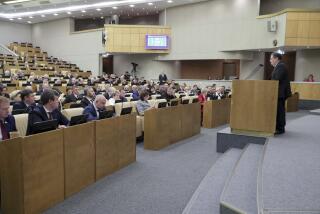New Russian Tax Code Gets Preliminary OK
- Share via
MOSCOW — Under heavy lobbying from Russia’s new government of economic liberals, the Communist-dominated legislature Thursday gave a preliminary nod to a drastically simplified tax code that aims to boost private business and stimulate economic growth.
President Boris N. Yeltsin, who later headed for the United States to take part in a summit in Denver, praised the proposed code--which would move Russia’s tax system closer to Western standards--as a big step toward attracting large-scale international investment.
“I want to tell you about our big victory,” a smiling Yeltsin said on Russian television shortly after the vote. “This is a huge issue for us, for foreign businesspeople and for Russians.”
The bill, passed at first reading before the Duma, or lower house of parliament, would slash the number of taxes from more than 70 to fewer than 30, lower tax rates, offer more deductions and eliminate many exemptions. It is partly an attempt to make an estimated 80% of wage earners give up what is now their favorite hobby--dodging the tax inspector.
“By our reckoning, it will become cheaper now to pay taxes than not to,” said the code’s creator, Deputy Finance Minister Sergei Shatalov, before the vote.
He promised that the government will take into account as many legislators’ objections as possible in later discussions.
The code is intended to boost prospects for companies operating in Russia by cutting their tax burden. And a range of business expenses would become tax-deductible for the first time.
Lower taxes would mean the government could lose up to $13 billion from next year’s budget, forcing spending cuts. The mostly Communist and nationalist deputies who make up the legislature oppose such cuts.
The Duma will get plenty of opportunities later in the year to air members’ objections again.
The bill, which government ministers hope will form the basis of next year’s budget, goes to committees for the summer and will come up for a second reading Nov. 1.
“In our view, this is a big experiment on the country . . . with unpredictable consequences,” said Georgy Boos, a legislator on the Duma Budget Committee, which recommended rejection of the plan.
But many anti-reform deputies voted for the bill, at least on first reading, because of fears that if it failed, the government might push for new parliamentary elections.
Since he was reelected last summer, Yeltsin has filled his government with tough young economic reformers and new millionaires, the first big winners of the race for wealth in the early 1990s. Economic reform, which had flagged, has taken on new momentum.
More to Read
Sign up for Essential California
The most important California stories and recommendations in your inbox every morning.
You may occasionally receive promotional content from the Los Angeles Times.










